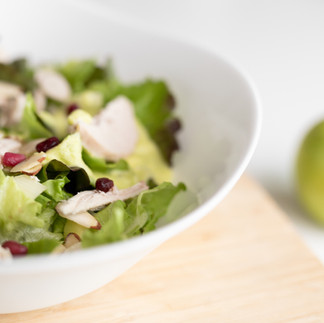Vitamin C: Our Unsung Histamine Hero
- histaminehavenmave
- Aug 22, 2023
- 4 min read
Updated: Jun 18, 2025

Here at Histamine Haven, we’re about so much more than eating low histamine.
Our goal is to help you get at the root of what is driving your own histamine mediated issues in your body, whether you have a diagnosis or not.
Part of this work also involves supporting your body in reducing how reactive you are!
The foods you eat on a daily basis have the potential of helping your body feel a bit more ‘safe’. Histamine issues are common in a body that doesn’t feel safe for some reason. While that ‘not safe’ feeling is common to those we work with, the reason behind that ‘not safe’ feeling is different from one person to the next.
The nutrient we are covering today – one of the two unsung heroes we go back to time and again with clients – is a great ally in helping your body feel ‘safe’, by reducing your reactivity. As you do this work, your symptoms start to subside!
Want to keep up to date with notices of new blog articles? Sign up here!
Vitamin C
Vitamin C is one of those non-negotiables when it comes to improving histamine mediated issues. It's a crucial vitamin in so many ways, and we are one of the only animals on the planet who cannot make our own. (Isn’t that wild, that other animals can actually make it?)
Vitamin C has been shown to be a potent antihistamine, by naturally decreasing histamine levels (1). It brings down the amount of histamine your body produces! In fact, lower levels of Vitamin C detected in animals (in guinea pigs, in this study) coincide with an increase in histamine levels in the system. (2)

Vitamin C has been studied in relation to alleviating respiratory issues in particular. It has been found to reduce symptoms where allergic rhinitis happens – sneezing, red watery eyes and runny nose type symptoms (3).
It has also been found to alleviate the symptoms associated with both cold-induced asthma (4) and exercise-induced asthma. (5)
Therefore, it's incredibly important to include Vitamin C in our daily foods, and more so for those of us who struggle with histamine or mast cell mediated issues.
Supporting your foundation
Vitamin C is also a key nutrient needed for the formation of collagen and all connective tissue – your intestinal lining in particular. If you understand that leaky gut (aka permeability at the gut lining) is one of the drivers of histamine release in the body (read more here and here), then it makes sense to include Vitamin C foods daily, as it is crucial in maintaining integrity in your gut, and helping maintain a robust gut barrier!
To Supplement, or Not to Supplement
This is the inevitable question. Our usual answer: start with low histamine Vitamin C foods first. Your body was designed to extract nutrients from your diet, and to get your vitamin C through the foods you eat.

In some cases, some will do well to add in a supplement. The trouble here is that some supplement sources of Vitamin C can be high in histamine, depending on the ingredients used (such as citrus). Some supplements also add other ingredients to the mix, which can potentially trigger histamine release in your body. Each body is unique, and supplementation requires a customized approach.
Our recommendation is to seek out food-grade a low histamine Vitamin C supplemental source such as camu camu powder, or acerola cherry powder. This last supplement is high in oxalates, so if you know that oxalates trigger histamine release in your body or is one of the potential drivers of your symptoms, it’s best to choose camu camu. (See how this requires a unique and different approach for each individual?)
Your tolerance to anything new needs to be tested. This is all part of your self-discovery on this histamine journey! We recommend you take your time and introduce a supplement slowly if this is a route you wish to take. If you are in Canada, check out our online supplement store here to see which brands we recommend.
Let’s eat!
Vitamin C is a water-soluble vitamin, which means our bodies do not store it if we get extra. This means we must work on including vitamin C rich foods daily, in order to supply that steady stream of antihistamine support.
When you think Vitamin C, it's inevitable to think about specific foods like lemon, citrus fruit and berries like strawberries and raspberries. Trouble here is, these fruit are also high in histamine, potentially adding to the amount of histamine your system is working through, perhaps triggering your mast cells to dump even more histamine, now compounding your symptoms.
Don't worry. We have you covered here at Histamine Haven.
Best low histamine Vitamin C rich fruits to feature:

apples
blueberries
blackberries
cantaloupe
cherries
cranberries
lychees
mango
persimmons
For veggies:
asparagus
broccoli
Brussels sprouts
cabbage
swiss chard
kale
onions, shallots

In herbs and teas:
basil
cilantro
dill
nettle
parsley
rose hips
thyme
Others:
camu camu berry powder
acerola cherry powder
Easy ideas:
feature a low histamine fruit or berry at the end of your meal, or add to salad (cantaloupe, blueberries, cherries, blackberries, apples; use our Shopping List as a guide); fruit and berries are typically high in Vitamin C
make a cup of nettle tea – it has some vitamin C!
add minced herbs like parsley, thyme, or dill to your meals after the cooking time in order to retain more of the Vitamin C

if you drink smoothies, consider adding 1/4 to 1/2 tsp of camu camu powder or acerola cherry powder to increase your Vitamin C
steam some Brussels sprouts to go with dinner
make the Sesame Broccoli recipe from the cookbook (p. 191)
try our Mango Chutney as a side dish tonight (p. 96; image to the right)
mince in some raw shallots or onions to your chicken salad (+ minced apple for even more Vitamin C!)
steam some asparagus for lunch
Need some inspiration in how to get more of these foods on your table?
Order our book from your favourite online retailer. You’ll get over 140 recipes that will help you with this task. Order yours today!



















Comments